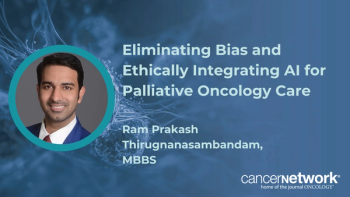
History of EBV, Immunosuppression Did Not Affect Outcomes of DLBCL
History of Epstein-Barr virus or immunosuppression did not affect outcomes for patients with diffuse large B-cell lymphoma.
Epstein-Barr virus (EBV)-positive diffuse large B-cell lymphoma (DLBCL) represented only a small fraction of this type of lymphoma among a cohort of Upper Midwestern US patients, according to the results of a study
“The lack of difference in clinical outcomes in the studied subsets should suggest to practicing hematologists that prognosis is independent of EBV status or a history of immunosuppression, among North American patients,” wrote Sean I. Tracy, MD, PhD, of the Mayo Clinic in Rochester, Minnesota.
According to the study, EBV-positive DLBCL accounts for between 2% and 16% of all DLBCLs in Asia or Latin countries. Positivity has been associated with advanced stage, extranodal disease, constitutional symptoms, and low rates of response to chemotherapy. However, studies in Western populations have shown a lower incidence of EBV and weak association with aggressive clinical features.
In this study, Tracy and colleagues wanted to define the prevalence, clinical correlations, and prognosis of EBV-positive DLBCL among patients from the upper Midwestern United States. The researchers identified 362 patients with newly diagnosed DLBCL with available tissue arrays from the University of Iowa/Mayo Clinic Molecular Epidemiology Resource. All samples were tested for EBV, and a history of significant congenital or iatrogenic immunosuppression was determined for all patients.
The median age of patients was 63 years. At trial enrollment, 4.4% of samples were positive for EBV and 10.8% had a significant history of immunosuppression.
Although the patients who were positive for EBV had no unique clinical characteristics, pathology showed a higher frequency of CD30 positivity (25% vs 8.1%; P < .01) and non–germinal-center subtype (62.5% vs 34.1%; P < .01) compared with patients who were EBV-negative. In addition, bone marrow involvement with large-cell lymphoma was more common in patients with EBV-positive disease (43.8% vs 18.5%; P = .03).
“However, we did not find evidence of an association of EBV positivity with aggressive clinical features such as B symptoms, multiple sites of extranodal involvement, or older age,” the researchers wrote.
After a median follow-up of 59 months and after adjustment for International Prognostic Index, no association between EBV positivity or immunosuppression was found with event-free survival at 2 years or overall survival.
“We conclude that among white North American patients, a history of immunosuppression is unlikely to confer an adverse prognosis,” the researchers wrote. “These results require verification in subsequent cohorts, using standardized definitions of immunosuppression.”
Newsletter
Stay up to date on recent advances in the multidisciplinary approach to cancer.











































